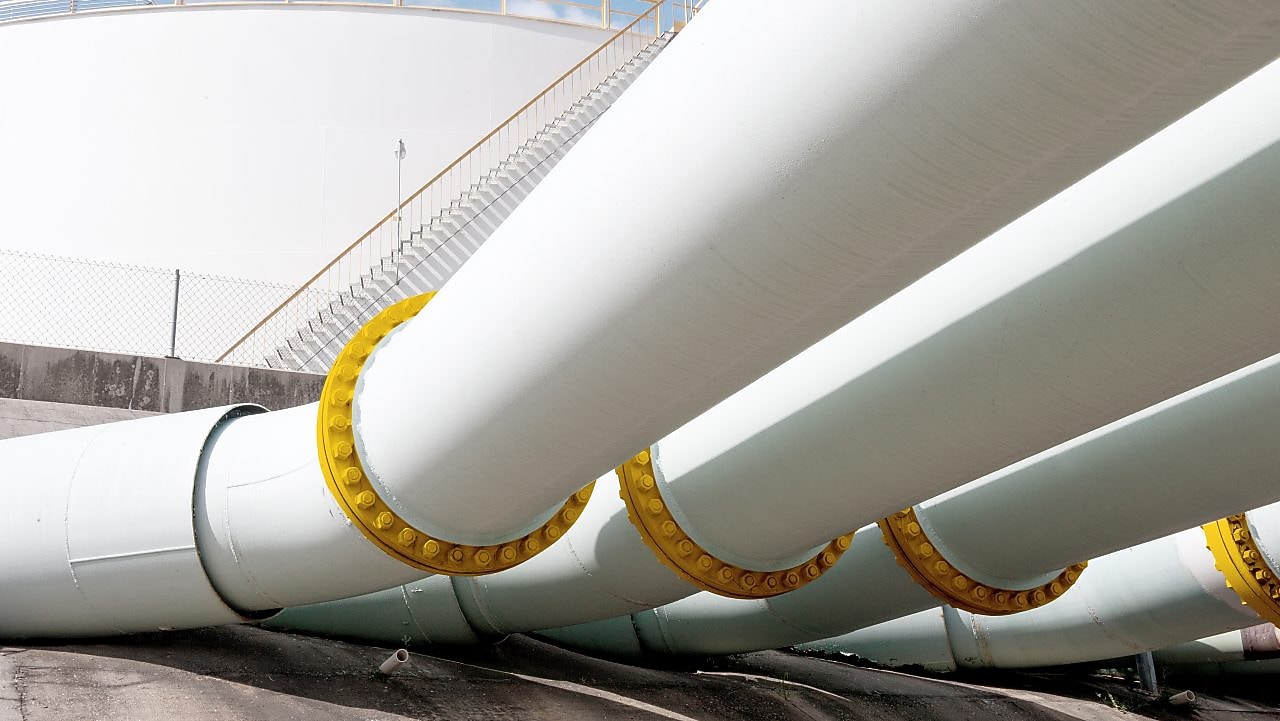Pipeline Conservation
At Shell Pipeline, we believe that responsible operations and environmental conservation can go hand in hand and are dedicated to integrating sustainable practices into our operations. Our commitment to conservation is guided by the American Petroleum Institute’s (API) Conservation Guidelines for Pipeline Right-of-Ways.
Falcon Pipeline Conservation Project
Year 1 Update
Year 2 Update
Read Transcript
Read Transcript
Title: SHELL PIPELINE COMPANY: FALCON CONSERVATION PROJECT
Duration: 4:37
Description:
The Montour Trail Conservation Project is a collaborative effort between Shell Pipeline, Pheasants Forever, and Penn State University – Altoona which seeks to improve local ecosystems, reduce erosion, and engage the community.
SHELL PIPELINE COMPANY: FALCON CONSERVATION PROJECT Transcript
[Birds chirping]
[Background music plays]
Shell Midstream, Advocacy and Engagement Specialist
Donnie Garrison
Donnie:
I always tell folks that I grew up on a pipeline.
Video footage:
Aerial view of a pipeline right-of-way through a forested area.
Donnie:
Gas industry has always been part of my life.
Video footage:
A man with a beard and a hat standing in a field.
Donnie:
Shell Pipeline operates over 3,000 miles of pipelines. Traditionally, you mow your right-of-way. Mowing is an easy practice. It's a common practice for us all. And it satisfies those regulatory requirements.
Video footage:
Aerial view of a wooded area with a large field and a house.
Donnie:
When you mow grass, it doesn't provide habitat for native plants or animals. I wanted to know if there was a way for us to change the way that we're maintaining our right-of-ways so we could make a positive effect in our environment.
Video footage:
Purple flowers in a field with a green background.
Donnie:
I met Carolyn during a right-of-way summit at Penn State.
Video footage:
A woman walking through a field of tall grass.
Donnie:
Carolyn is a subject-matter expert, been doing this kind of work with power utility companies for a long time.
Video footage:
Someone is holding a plant in their hand in a field.
Donnie:
And I asked her, I said, can this be applied to pipelines? And she said yes. And our partnership started that day.
Carolyn:
So this is the type of habitat that we are looking for.
Video footage:
A woman walking through a field of flowers.
Penn State University, Professor of Biology and Researcher
Carolyn Mahan, Ph.D.
Carolyn:
This is September in the Appalachian Mountains. And this is a fairly representative old-field habitat. There's 25 different species of goldenrod in Pennsylvania, and this is one of them. So I'm a professor of biology. And I also am a researcher. And I run a program in environmental studies which uses interdisciplinary learning to solve environmental issues. Right now, there are millions of acres that are in human landscapes--
Video footage:
A field of grass with the sun shining through the grass.
Carolyn:
--in particular, rights-of-ways, that we manage in a very traditional way.
Video footage:
A tractor mowing down the road.
Carolyn:
If you can take those millions of acres and promote native plant communities, that could be a game changer for important wildlife that the ecosystem and, in fact, humans depend upon. I was resistant to working with Shell for a little while until I met Donnie, to be quite honest. My concern was that I needed a company that was going to be interested in research. Once I realized they were committed to research, not just a demonstration, then I became interested in working with them.
Video footage:
Aerial view of a pipeline wooded area.
Donnie:
The basis of this project is for us to look at the different techniques and apply the best techniques throughout our right-of-ways and our facilities for Shell Pipeline.
Video footage:
Man in a green shirt and hat standing in a field.
Donnie:
We have a lot of the right partners in place like the Penn States and the Pheasants and Quail Forever working with us because they have the knowledge. We're helping show, how do you apply that knowledge to our assets?
[BEES BUZZING]
Pheasants and Quail Forever, Rights-of-Way and Energy Coordinator
Mike Retterer
Mike:
As we were collaborating on other projects and looking at other opportunities across the country, this one just came up, brought it up. It's, let's go look at it and see if there are any opportunities. And then we talked through it together.
Video footage:
A man in an orange shirt and a hat. A bee that is sitting on a yellow flower.
Mike:
We decided the Shell Falcon pipeline would be a good case for best management practices for a right-of-way. And then it evolved into a great opportunity to do a research project.
Carolyn:
Shell helped us design this project to look at different types of treatments on pipelines so that we could see how biodiversity responds to different ways of managing vegetation.
[GUITAR MUSIC]
[Text displays]
Mowing Vegetation Management
Donnie:
We're doing a really big event.
Video footage:
Group of people walking down a dirt road in a field.
Donnie:
We have almost 60 guests, well over 20-plus state officials that we've been able to engage with. Typically, they don't show up to this kind of stuff.
Donnie:
Yeah, so traditionally, you mow your right-of-way.
Donnie:
We normally would say this is fantastic. It looks great. It's green. We can see our pipeline markers. That's a lot of pride of what I said that how we used to operate.
Video footage:
A sign reads, "Habitat management in progress."
Carolyn:
We have many species along this right-of-way.
Carolyn:
--types of rights-of-way to provide that type of habitat.
Video footage:
Many people standing on the side of the road.
Donnie:
Just learning with our partners that there's other opportunities to implement different techniques that is going to benefit the environment as well as benefiting your operations.
Mike:
What I'm looking for as a result of this is not only Shell but other pipeline companies taking this information and then implementing these management techniques across the landscape just because the large, vast connective habitats that this could create across the country.
American Petroleum Institute, Vice President of Midstream Policy
Robin Rorick
Robin:
Just by switching and changing one behavior, you're able to get a whole host of benefits-- pollinators, gaming species like deer and turkey, supporting endangered and threatened species.
Video footage:
A sign that reads, "No Mow Area" on it.
Video footage:
A man in a blue shirt standing in front of a field.
Donnie:
Us as a pipeline industry, we can all make changes.
Video footage:
A tall plant with white flowers in a field.
Donnie:
I'm very proud of our partnership with Penn State, Pheasants and Quail Forever, and American Petroleum Institute. You having non-traditional partners partner up and you working for a change is a positive effect in our environment.
Video footage:
A woman that is picking some flowers from a tree.
Donnie:
It was a goal for all of us.
Video footage:
A yellow and white sign in the middle of a field.
[GUITAR FLOURISH]
Read Transcript
Read Transcript
Title: Shell Pipeline Company: Falcon Conservation Project – Year 2
Duration: 3:38
Description:
A year 2 update on the Falcon Conservation Project, a collaborative effort between Shell Pipeline, Pheasants Forever, and Penn State University - Altoona. This initiative aims to enhance biodiversity and habitat management by integrating conservation techniques such as conservation mowing, integrated vegetation management, and restoration.
Shell Pipeline Company: Falcon Conservation Project – Year 2 Transcript
[Background music plays]
Bright, uplifting music sets a positive tone for the video.
[Video footage]
Right-of-way vegetation with Habitat Management in Progress sign.
Professor of Biology and Researcher, Penn State University
Dr. Carolyn Mahan
[Carolyn]
How can we take a human landscape and manage it so that humans and wildlife can coexist?
[Video footage]
A woman walking through nature, holding a cutting from a plant.
[Video footage]
A woman walking through nature, holding a cutting from a plant. Bee on goldenrod plant.
Advocacy & Engagement Specialist, Shell
Donnie Garrison
[Donnie]
You just imagine the impact that we're having here, being able to take just a small section of five miles and turning it into habitat.
[Video footage]
A man with a beard and a hat walking through a field, then standing in a field.
[Video footage]
Aerial view of a wooded area with a pipeline right-of-way.
[Text displays]
Falcon Conservation Project
Update 2025
[Video footage]
Right-of-way marker with vegetation and Habitat Management in Progress sign.
[Video footage]
Group of people standing in a field.
[Donnie]
This research project covers five miles of our Falcon pipeline right-of-way.
[Video footage]
A man with a beard and Shell shirt and hat speaking to camera.
[Text displays]
Donnie Garrison
Advocacy & Engagement Specialist, Shell
[Video footage]
A map shown on a TV screen with a man pointing to it.
[Carolyn]
So Shell is changing the way they manage the Falcon pipeline by using a variety of management techniques, including planting, conservation mowing, selective use of herbicides to promote more variety and diversity of habitat.
[Video footage]
A woman with a Penn State polo speaking to camera.
[Text displays]
Dr. Carolyn Mahan
Professor of Biology and Researcher, Penn State University
[Video footage]
A man with knee on the ground, looking at a seed.
[Video footage]
Tractor drives through field.
[Video footage]
Sprayer sprays green grasses.
[Video footage]
A woman with a Penn State polo speaking to camera.
[Video footage]
Bee sits on yellow bloom of a goldenrod plant.
[Donnie]
Our single goal of this project would be to show the best techniques that not just Shell, but other pipeline companies can apply along their right-of-ways.
[Video footage]
A man with a beard and Shell shirt and hat speaking to camera.
[Video footage]
Group of men in field. One holding a clipboard.
[Video footage]
Two women in field, looking closely at grass vegetation. One holds a clipboard.
[Video footage]
Woman’s hand holding top of plant.
[Background music plays]
Bright, uplifting music.
[Video footage]
Yellow, red and white pipeline marker on right-of-way.
[Video footage]
A woman with a Penn State polo speaking to camera.
[Carolyn]
We're just starting year two, and last year was a very interesting year for us because we found rare species of plants that we did not expect to find,
[Video footage]
Gray-headed Coneflower with yellow petals and bee on top of one flower.
[Carolyn]
One being the Gray-headed Coneflower, which is considered rare in Pennsylvania.
[Video footage]
Golden bumblebee sits on purple flower.
[Carolyn]
We also have found the Golden Bumblebee, which is rapidly declining throughout its range
[Video footage]
A woman with a Penn State polo speaking to camera.
[Carolyn]
in Eastern North America.
[Video footage]
A man with a beard and Shell shirt and hat speaking to camera.
[Donnie]
We've been able to really come out and visibly see that the grass structures have changed.
[Video footage]
Tall grass in field.
[Video footage]
Zoom in on stems.
[Video footage]
Moving through tall grass in field.
[Donnie]
And we're in the process of implementing
[Video footage]
A man with a beard and Shell shirt and hat speaking to camera.
[Donnie]
a vegetation management program, and that program is gonna cover all our pipeline systems,
[Video footage]
Person holds white net walking through the field.
[Donnie]
but the techniques that we're learning today,
[Video footage]
Two people observe the white net.
[Donnie]
we're already applying in different areas of our pipeline operations.
[Video footage]
A man with a beard and Shell shirt and hat speaking to camera.
[Video footage]
Yellow, red and white pipeline right-of-way marker next to Habitat Management In Progress sign.
[Video footage]
A woman with a Penn State polo speaking to camera.
[Carolyn]
In March, Shell tried a new technique called hydroseeding,
[Video footage]
Black and white drone sitting next to white bag of seed.
[Carolyn]
where they use drones to apply
[Video footage]
Seeds pour into white container on drone.
[Carolyn]
native seeds of perennial plants to steep slopes
[Video footage]
Black and white drone flies up a sloped right-of-way spraying seed.
[Carolyn]
along their pipeline. The idea is that those perennials will develop deep root structures that will help hold the soil in place on steep slopes.
[Video footage]
A woman with a Penn State hat and clipboard speaking to group off camera.
[Carolyn]
See if it’s a bunch grass. You wanna look and see if it’s growing in a bunch at the bottom.
[Video footage]
Woman with a Penn State hat and clipboard turns to camera with group behind her in a field.
[Carolyn]
So the people that are here today is a mixed group of government officials,
[Video footage]
People in the group listening to speaker.
[Carolyn]
as well as industry, people from Shell,
[Video footage]
People gathered, one with clipboard, reviewing documents on it.
[Carolyn]
people from affiliated industries associated with energy companies.
[Video footage]
People gathered, one with phone taking photo of a plant.
[Carolyn]
And there's also people from some of the local conservation organizations.
[Video footage]
Penn State speaker directs crowd.
[Carolyn]
So we have a mixed group.
[Video footage]
Woman with a Penn State hat and clipboard speaking to camera.
[Carolyn]
The idea is to bring everyone together, share ideas, so that we can all come together and find a common goal for conservation of this right-of-way.
[Video footage]
Penn State speaker talks to off-camera group.
[Carolyn]
So what we can do this year
[Video footage]
Group of people standing in field listening.
[Carolyn]
is we're collecting pollinators, and then next year we can collect them again. And if we compare the data, we'll be able to see the importance of pithy stems in the winter.
[Video footage]
Penn State speaker talks to off-camera group.
[Carolyn]
Like how did the community change when the pithy stems were left on the site?
[Video footage]
Group of people standing in field listening.
[Carolyn]
You guys were great, best group. Honestly, I didn't say that to every group.
[Background]
Group laughs. Uplifting music plays.
[Video footage]
Group of people standing in field talking.
[Donnie]
But when we stand out here and we hear and we see, and we have the folks come out
[Video footage]
A man with a beard and Shell shirt and hat speaking to camera.
[Donnie]
and see how great it is for everyone, just think of that kind of scale throughout the United States and even beyond, it's really kind of mind-blowing.
[Video footage]
White and yellow flowers in a field of grass.
[Video footage]
A man with dark hair speaks to camera.
[Text displays]
Robin Rorrick
Midstream VP, American Petroleum Institute
[Robin]
It's great to see a company like Shell leading in this progress.
[Video footage]
A man with a beard and Shell hat speaking to group outside.
[Robin]
For the more that we can take things like this and show it more broadly and show other companies,
[Video footage]
A man with a grey and orange hat speaking and pointing up.
[Robin]
I'm hopeful that it can be taken up even more rapidly, more broadly throughout our industry.
[Video footage]
Aerial view of a wooded area with a pipeline right-of-way.
[GUITAR FLOURISH]
[Animated sequence]
Shell pecten appears on white ripple background
Sustainable Pipeline Management
We recognize the importance natural habitats and are seeking opportunities to integrate habitat management techniques into the management of our pipeline right-of-ways. By adhering to API’s comprehensive guidelines, we are working to implement best practices that minimize environmental impact and promote biodiversity. Our strategies include:
- Habitat Restoration: Working to restore and maintain native vegetation along our pipeline routes, creating thriving ecosystems that support local wildlife.
- Erosion Control: Enabling native plants with deeper root systems to thrive, aiming to prevent erosion and promote healthy landscapes.
- Invasive Species Management: Identifying and controlling invasive species, ensuring that native plants and animals can flourish.
Community Engagement
We believe that conservation is a collaborative effort. By engaging with local communities, we foster a shared commitment to environmental stewardship. Our initiatives include:
- Partnerships: Collaborating with academic institutions, environmental organizations and local stakeholders, we work together to achieve common conservation goals.
- Volunteer Opportunities: We encourage our employees and community members to participate in conservation projects, fostering a culture of environmental responsibility.
Continuous Improvement
Our commitment to conservation is an ongoing journey. We continuously evaluate and enhance our practices and collaborate with partners such as academic institutions and environmental organizations to measure the biodiversity impact of our efforts.
Together, we can create a sustainable future for generations to come.
Project Spotlight:

Bayou Teche Wildflower Energy Project
Shell Pipeline, in collaboration with Friends of Bayou Teche National Wildlife Refuge, has launched the Wildflower Energy Project in St. Mary Parish. This initiative aims to establish approximately 20 acres of native wildflowers and grasses on pipeline right-of-ways. The project promotes biodiversity, supports pollinators, birds, and other wildlife, and enhances the area’s natural beauty. Shell’s efforts are part of a broader goal to integrate conservation techniques into pipeline maintenance, setting a model for the industry and contributing positively to local ecosystems and communities.
Shell Pipeline kicks off Wildflower Energy Project | Shell United States
Wildflower Energy Project | btrfriends (bayoutecherefugefriends.org)

Falcon Conservation Project at Montour Trail
The Falcon Conservation Project at Montour Trail is a collaborative effort between Shell Pipeline, Pheasants Forever, and Penn State University - Altoona. This initiative aims to enhance biodiversity and habitat management along the Falcon pipeline right-of-way in Washington County, PA. By integrating conservation techniques such as conservation mowing, integrated vegetation management, and restoration, the project seeks to improve local ecosystems, reduce erosion, and engage the community. Penn State is conducting research to assess the impact on wildlife and plant diversity, providing valuable insights for future conservation efforts.
Penn State, Shell collaboration funds environmental research project





